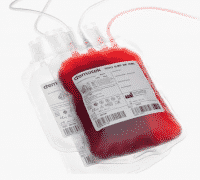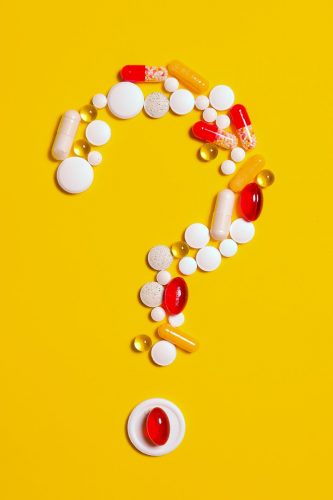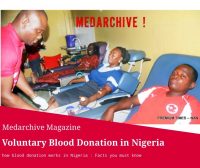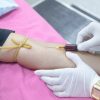Are you planning to donate blood for the first time? And maybe you might be feeling nervous or may be having a mixed feeling. Don't worry, it happened to me too on my first day. And I will be sharing my first time blood donation experience with you. If you actually read till the end, you will find out what happens when you donate blood for the first time, and all you need to know before giving blood for the first time.
Blood is very rare to find, and much rare are the voluntary non-remunerated blood donors. It is said that the best form of blood to give a sick person is blood from a voluntary blood donor. This is also most preferred by public health workers, blood banks, and hospitals. The current state of voluntary blood donation in Nigeria is something that is worth discussing. This is because a lot of people do not know how it works, their rights, the requirements, etc. What is much worse are the myths associated with blood donation in Nigeria.
A lot of people still feel scandalized by the concept of blood donation even with the overload of information on this topic. And I think it is very necessary that this topic is thrashed down here once and for all.
Before I share my first-time blood donation experience with you, it is good you understand what blood donation means, and know some important facts about blood donation.
Table of Contents
- Volunary Blood Donation In Nigeria
- What You Should Know Before Giving Blood For the First Time
- My First Time Blood Donation Experience in Nigeria
- Advantages of Blood Donation
- Cons, Side-effects, and Disadvantages of Blood Donation
- What Discourages Voluntary Blood Donation in Nigeria?
- How To Motivate Voluntary Blood Donors in Nigeria
- Final thoughts
Volunary Blood Donation In Nigeria

What is Blood Donation
Blood donation is said to have taken place when someone willingly allows their blood to be drawn out of their veins which is given to another patient in need of blood or separated into one or more parts of the blood like plasma, platelets, clotting factors which are still given to a patient who is in need of blood or any of the mentioned products.
The whole process of blood donation should be completely healthy for both the donor and the receiver.
Types of Voluntary Blood Donation
Voluntary blood donation is divided into two types;
- Voluntary Non-remunerated Blood donation (Free-will blood donation)
- Voluntary Paid Blood Donors
The voluntary non-remunerated blood donors are those blood donors who voluntarily donate blood without the intention to receive any form of compensation. These are also called free-will blood donors or non-paid donors.
What You Should Know Before Giving Blood For the First Time

I. You Should Not Know Which Patient Receives Your Blood
To make sure that a blood donation process is completely based on free will and zero bias, it is run in a blindfold manner. This means that as a free-will blood donor, you are not expected to know which patient receives your blood or even meet the patient relatives.
Although this may not be so in some cases, it is the ideal thing to make sure that the free-will donors do not go behind the scene to seek compensation or special favor from the patient’s relatives. It could be tagged as a form of blackmail.
On the other hand, Voluntary paid blood donors are those people who donate blood because of the rewards they may get from it. Rewards could be in form of money or any other form of compensation.
The compensations, in this case, should not be misunderstood as incentives that may be given to voluntary blood donors by organizations like the red cross, and the rest. In this case, the paid donors donate the blood with the view of getting the compensations while the non-paid blood donors just donate blood with nothing in mind, but may still receive benefits that may come from donating blood.
II. Blood banks Prefer Free-will Blood Donors
Based on the trends observed in various blood banks in Nigeria among paid donors, below are the reasons why blood banks in Nigeria take extra care while dealing with paid donors.
The major reason is that paid donors are more likely to cut corners to make sure they donate blood and get paid. This could be as worse as doping to boost their red cell count, or lying about being infected with blood transmissible infections.
Also, paid donors are more likely to neglect the rule governing how often one can donate blood and may end up putting themselves at potential health risks.
III. Other Blood Components Can May Be Donated
If someone tells you they are going to donate blood, for a layman, the first impression is that they are going to donate the red blood cells which is the most easily seen of all the components of blood.
But we should know that there are many other components of blood that could still be donated and which can be helpful to a patient. But the problem with these other blood products is that many health facilities in Nigeria do currently have the capacity to separate these other components of blood and give the needed parts to the patient while returning the other parts to the donor.
Also, in the very few facilities where this procedure could be done, you find out it is usually very expensive. So the blood bank just transfuses the whole blood from the donor to the patient.
Now, this brings us to two very important topics; the whole blood transfusion and the blood component transfusion.
IV. What is Whole Blood Transfusion?
The whole blood transfusion involves the transfusion of all the blood components as it is without the removal of any constituent. This type is the most popular form of blood transfusion in Nigeria.
The components of whole blood include:
- Red cells: Usually given to people suffering from anemia, iron deficiency, and related illnesses.
- Platelets: Platelets are given to sick people who are suffering from a bleeding disorder.
- Plasma: Plasma is the liquid that other components of blood flow on. It contains very important proteins, chemicals, clotting factors that play various roles in the body. It is usually given to patients with severe infections, burns, liver failure, etc.
The other type of blood transfusion occurs when one or more of the above components of whole blood is separated by a process called Apheresis, and then transfused to the patient, while the rest of the blood components are transfused back to the donor.
This second method is actually healthier for both the donor and the recipient, but it is more expensive.
My First Time Blood Donation Experience in Nigeria

If you are planning to donate blood in Nigeria, you should know that all blood banks and blood donation centers in the country are not exactly the same. Some will always be more effective, have more friendly staff, and may even offer incentives to both free-will and paid donors. But in all, the process is basically the same everywhere in Nigeria.
To actually help you understand the process of voluntary Blood donation in Nigeria, I will be using my own personal blood donation experience so that you can relate better to it. And of course, it was a free-will voluntary blood donation.
For the sake of privacy, I will not be mentioning the health care facility where I donated the blood, but will just share tips based on my own experience.
Preparing For Voluntary Blood Donation in Nigeria
Blood donation is not just something you decide to do in a few days and delve into it. It has very strict rules and guidelines that must be followed for your own safety and that of the person you are donating to.
There are things you can find out yourself to see if you are eligible for blood donation, and there are others that can only be done at the blood bank.
Do’s and Don’t Before Donating Blood
- First, you must be 18-65 year old
- Ensure that you have not donated blood for the past 3 months
- Make sure you are not suffering from any form of Blood (transfusion) transmissible infections like HIV, Hepatitis, etc.
- Ensure you are not a pregnant or breastfeeding mother
- You must not be suffering from some critical diseases like hypertension, cancer, etc.
- You should feed well on balanced diets within the few days before donating blood.
- Drink plenty of water before going to the blood bank for blood donation
- Wear a convenient clothe before going to donate blood. Short leaves or sleeveless shirts are much preferred.
You will find out if you meet all the blood donation requirements at the blood bank, and then you will be told if you are eligible to donate blood depending on their findings.
Also, Read; 20 Blood donation Requirements
Getting to the Blood Bank
Ideally, there are meant to be staff whose job is to guide voluntary blood donors on what to do when they get to the blood bank. And usually, more preference is given to the free-will blood donors and they are usually first attended to before any paid donor.
But in my own experience, there seemed to be lesser blood bank staff, as well as laboratory equipment used in running the eligibility tests in the blood banks compared to the number of voluntary donors present on that day.
But the first step you should take on getting to the blood bank as a free-will blood donor is to either meet the most senior person around and introduce yourself stating clearly that you are a free-will blood donor.
The Eligibility Tests Before Blood Donation
After this, the next step in my own case was that the secretary recorded my biodata in a blood bank record book. The information they asked for include:
- My full name
- Age
- Sex
- Address
- Blood Group, Genotype (This is routinely asked even though it would still be tested for)
- Phone Number/Contact details
After this, I was directed to a nearby room where a Medical laboratory attendant took some samples of my blood from my left arm using a syringe. This was after she cleaned the area with a spirit swab. The blood sample was going to be used to check if I was eligible for blood donation.
Usually, you are asked to choose which arm you want the blood sample to be collected from. Most people prefer the blood sample to be collected from their dominant arm (usually the right arm for most people) so that they could donate the blood using their non-dominant arm.
The reason is that assuming such issues arise from the process of blood donation, you may not have much to worry about since your dominant arm is intact. But usually, not many issues arise from blood donation.
After the sample is collected, the lab attendant runs a series of blood tests on you including; your blood group, genotype, Viral screening, and other eligibility tests.
Also, Read; Blood Type Charts, Genotypes, and Grouping
This usually should not take up to 45 minutes to one hour. But in my case, I had to wait for close to 2 hours because there were fewer machines available for the test, and the blood samples to be tested were much on that day.
The Counselling Before Blood Donation
When your test result is ready, you will be called into another private room called the counseling room. Here, you will meet a specialist who will reveal your lab results to you, and tell you if you are eligible to donate blood.
Remember to check the eligibility criteria for blood donation to find out more about when you can donate blood.
When you have met all the Laboratory blood donation requirements, you will now go to the nutritional and fitness status check. This is one of the benefits of blood donation because all these tests are carried out on you for free plus free counseling without you having to pay a dime.
These other tests will help you find out if you are physically fit and healthy donate blood.
The following are checked for your nutrition and fitness status:
- Your Height
- Weight
- Body Mass Index (Calculated from your height and weight)
- Blood Pressure
- Pulse rate and
- Temperature
- Also, the counselor will find out when last you donated blood, and if you have any illness, occupation, or lifestyle that could prevent you from donating blood.
Once the tests are complete, and you are eligible for blood donation, you will now be taken to the ‘bleeding room’.
The Bleeding Room
The name bleeding room can actually sound scary especially if it’s your first day, and maybe you hear something like:
“take this donor to the bleeding room”…lol
The bleeding room is just a place specially designed for blood donation to take place. It should ideally be very conducive for the donors and contain things like; a comfortable bed, air conditioner, some blood banks may even have a stereo playing cool music, and the like.
So you lie down on the bed, while a nurse or a trained blood bank attendant puts a needle into your preferred arm and connects it to a special blood bag with anti-coagulants to make sure it does not clot.
But before the needle is inserted into your arm, the area where the needle is to be inserted is first cleaned with a spirit swab (methylated spirit and cotton wool).
Then you are given a small cylindrical container or a pen, which you place in the palm of the hand the blood is collecting from. And you are told to squeeze the pen or the object until the blood bag is full.
The reason for the squeezing is that it makes the process faster.
How Does Blood Donation Make You Feel?
We will be looking at the various feelings which come from blood donation, including the painful and beautiful ones.
Is the Blood Donation Process Painful?
Well, for me I would say it is just like receiving an injection. It is usually painful at the insertion of the needle and at the removal of the needle. But during the process, you are not supposed to feel much pain.
But I really cannot speak for everyone as we all have different pain thresholds. And what may be less painful for some people will be more painful for some. So it is best experienced than being told.
Also, on the good side, some people actually say they feel good helping someone during the blood donation process. In my blood donation experience, the feeling was mixed. But I was actually happy I was saving a life.
What Happens After Blood Donation?
Once the blood bag is full, the nurse will safely remove the needle, then place cotton wool over the area that was punctured, and then uses plaster to hold it in place. You should not remove the cotton wool till after about 15-30 minutes when the place is completely closed by blood clots.
Also, you are meant to keep resting on the bed for about 30 to 45 minutes for the remaining blood to recirculate in your body and reach vital organs like your brain. This is to help prevent issues like fainting or hypotension.
You may give snacks, bottled water, Milk and malt, etc after this depending on the blood bank, but in my case, nothing was given. But I found a nearby canteen and got a bottle of water which I finished. This was necessary to prevent fainting.
Regaining Yourself after blood donation
There are a few tips that could help you regain yourself faster after an episode of blood donation, and they include;
- Drink plenty of water: This should start from the moment you finish blood donation over the next 24 hours. It takes our body about 12 to 24 hours to replace the fluid we lost during blood donation.
- Do not engage in any strenuous physical exercise till 2 days after blood donation. This includes sex, hitting the gym, running, playing football, etc.
- Eat well for the next few days. This should include a balanced diet with milk, eggs, and lots of fruits and green leaf vegetables.
- Finally, have lots of rest and sleep.
And that’s it!
Advantages of Blood Donation
There is no limit to the benefits of blood donation. The one that will interest you most is definitely the health benefits of blood donation. It has been proven that blood donation helps to reduce the risk of certain diseases like cancer as it lowers the iron levels in the body. This is just one of the benefits of blood donation.
Also, Read; Are there any benefits of blood donation?
Cons, Side-effects, and Disadvantages of Blood Donation
There are not many side effects associated with blood donation especially if the procedure and tests are carried out well. But in a few cases, some donors complain of the following:
1. It Wastes Time
Voluntary Blood donation in Nigeria takes an average of 2 to 3 hours before it is completed. So most people complain that this time is quite much to spend on donating blood.
2. Pain
This is also one of the major complaints a few persons make after donating blood. The truth is that it is not completely painless, but it is also not so painful except you have a very low tolerance for pain.
3. It Could lead to Fainting
If you do not follow the guidelines I just shared about your conduct after blood donation, you may be at risk of fainting. This is especially if you fail to take enough water before and immediately after donating blood. And also, if you do not lie down for at least 30 minutes after donating blood.
4. It Could Cause Light-headedness, Dizziness, and Nausea
These are also some of the symptoms one may experience immediately after donating blood.
5. It Could Cause Continuous Bleeding
For people who have issues with blood clotting, the area where the blood was collected may continue to bleed until an intervention is made. This is usually very dangerous if not handled on time.
6. It Causes Bruising and Inflammation of the area
Some people might notice that the area from which they donated blood is inflamed. This appears as a painful swelling that may persist for 3 days or more.
7. Physical Weakness
Our blood contains oxygen and which is supplied to all parts of our body including the muscles that are in charge of physical activity in the body. So after blood donation, one may experience transient weakness due to a decrease in oxygen supply to the muscles.
This also explains why bodybuilders and sportsmen do not donate blood as often as normal people.
8. Others
The last disadvantage is in cases of some people with specific occupations like drivers, pilots, scaffolding, etc. They are at risk of fainting at work after blood donation and could put the lives of many in Danger.
What Discourages Voluntary Blood Donation in Nigeria?
Nigeria is a very diverse society with people from various socio-cultural orientations and beliefs. Apart from the myths associated with blood donation, a lot of people who are willing to be voluntary blood donors are constantly discouraged to donate blood because of the state of things in the country.
Many of them are worried about the following;
- Fear that their blood may be sold: This is not usually the case for free-will donated blood. But one cannot also vouch that there are no fraudulent blood banks in the country.
- Poor Phlebotomy Technique: Phlebotomy is the process involved in the collection of blood. So many people fear that the procedure may not be done so well, and they may be at risk of getting infected.
- Fear that their blood may be disposed of without use: Due to the bad condition of many blood banks in Nigeria, there are fewer technologies and machines available that could help in the preservation of blood and its products so that they could last longer. So many people fear that their blood may be discarded once it is no longer good for use.
- Fear of knowing their Viral Screen Status: Also, many voluntary blood donors in Nigeria do not actually like knowing their HIV status or other STI status. This prevents them from visiting the blood banks.
How To Motivate Voluntary Blood Donors in Nigeria
Recently, I no longer hear about the Red Cross blood donation drives and campaigns in Nigeria. Also, blood donation in Nigeria suffers a lot of stigma from some religious groups and cultures which overall discourages the effort of blood donation campaigns.
But that notwithstanding the obstacles, there must always be a way to circumvent these and increase people’s participation in voluntary blood donation in Nigeria. Most people are motivated to donate blood only when a relative or close friend is the one affected. But this practice should be taken as a routine even when we may not know the patient.
The best way to motivate voluntary blood donors in Nigeria is to take the sensitization programs very seriously. More people need to be educated so that the myths about blood donation can be demystified.
Final thoughts
Now that you have read my first time blood donation experience and the facts surrounding it, I hope you feel motivated enough to go ahead with your own first experience.
Voluntary blood donation in Nigeria is very important for the growth treatment of patients and the growth of medicine. While we wait for scientists to figure out an alternative for hemoglobin and red cells, the best we can do as humans are to be a channel of blood supply to our fellow humans.
At least, blood is renewed every 120 days, so there is nothing much to lose by giving a pint once in a while.




